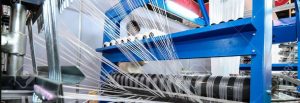Since 2007, Innovate UK has invested around £2.5bn to help businesses across the country to innovate, with match funding from industry taking the total value of projects above £4.3bn.
Innovate UK has helped 8,500 organisations create around 70,000 jobs and added an estimated £18bn of value to the UK economy. In the period 2019/2020, Innovate UK received 5,794 applications for grant funding and made 949 awards. £645,886 was awarded in terms of grant funding, 24% of the total amount applied for.
West of England Textiles Company Limited Industry Sector: Textile Manufacturing
West of England Textiles Company Limited is a textiles manufacturer based in Huddersfield. The company applied to Innovate UK for funding of £99,887 to enable them to carry out feasibility studies into an innovative manufacturing process that could alter the quality of woollen textiles produced from British wool to enable it to be incorporated into a number of sectors (apparel, home and automotive furnishings) for export as high value products to Japan, US and China.
It was argued that the British luxuries industries is a growing market with around 78% destined for overseas. The innovation surrounded the development of a new manufacturing process involving the application of existing laser and vacuum steam technologies into the textile sector in an attempt to improve the softness of British wool fibres.
It is the case that textiles manufactured from British wool are typically coarser than that manufactured from imported Australian wool on account of British wool fibres having a larger diameter. The aim of the new manufacturing process was to reduce the diameter of the British wool fibre and in so doing, improve the quality of textiles made from British wool and match the quality of textiles manufactured from imported wool. West of England stated that the project was important as it would result in an increase in their manufacturing productivity and a step change in their competitiveness given that they would manufacture higher value British textiles with increased export potential.
The company stated that the project would also see financial benefits to the whole UK supply chain which are mainly SMEs from farmers, wool processors, weavers, cloth finishers and cloth converters who turn the cloths into a range of products.
The Company was successful in the application and received funding of £44,949.

Button Brand Designs Limited Industry Sector: Graphene Technology
Button Brand Designs Limited applied to Innovate UK for grant funding of £83,211 to enable feasibility studies to be carried out into the development of ultra-light and efficient graphene based LED lighting for installation at indoor farms and in standard greenhouses. The Stc Research Foundation, Selby, is a project participant.
In the application, the company stated that whilst graphene had been used as lighting material in products developed for domestic use, office use, street lighting and decorative applications, it had not been used for horticulture. The company stated that graphene is the strongest material ever tested, conducts heat and electricity extremely efficiently and is nearly transparent and these properties make it an excellent lighting material when used in conjunction with light emitting diodes.
The company expects the benefits of using graphene in products for the horticultural industry to include easier installation and a reduction in labour costs together with a more even distribution of light on account of its near transparent nature.
Button Brand Designs Limited received £58,248 by way of funding and the participant, £15,339.

Zero Brush Limited Industry Sector
Manufacturing Zero Brush Limited has applied to Innovate UK for grant funding for a collaborative R&D project for the purpose of developing the world’s first cold-water soluble, fully biodegradable pre-pasted toothbrush, which is non-toxic to the environment, wholly degradable and with zero end of life impact.
The impetus for the project is the amount of toothbrushes that go into landfill each year globally and a desire to reduce the number. it is averred that the healthcare industry makes a substantial contribution to this by providing patients with plastic toothbrushes that are often left on the side and dropped onto the floor, causing them to need to be replaced. The Zero-brush is pre-pasted with quality organic food grade toothpaste.
There is no SLS to foam and no fluoride therefore no requirement for spitting or rinsing. Patients in hospitals can brush their teeth comfortably without the need for nursing support. As it is single use and soluble there will be no toothbrush left on the side creating risk of spreading germs.
Aimed at single use, the ZeroBrush is an innovative solution for a wide range of end users, such as the healthcare sector (hospitals, dental care, care homes), the military, leisure industry (hotels, camping, festivals) and the travel industry. The project has been offered £117,337 by way of funding.
To download a copy of this manufacturing case study, please click here.


